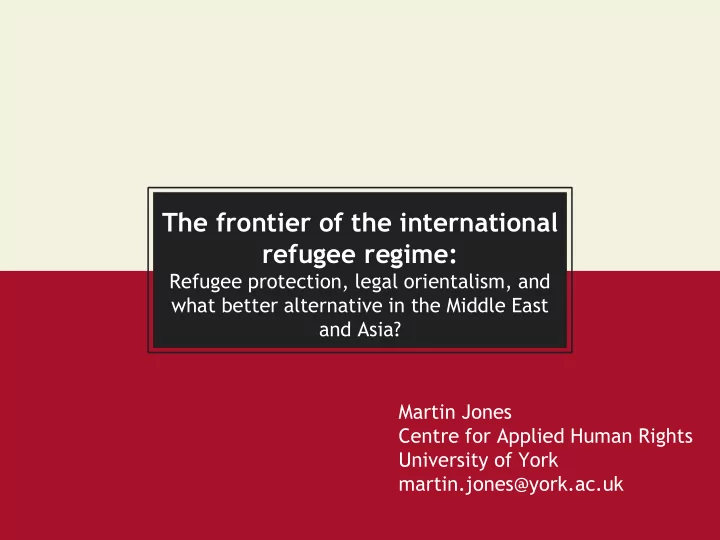

The frontier of the international refugee regime: Refugee protection, legal orientalism, and what better alternative in the Middle East and Asia? Martin Jones Centre for Applied Human Rights University of York martin.jones@york.ac.uk
The Problem
The Argument Traditional accounts of refugee protection in the Middle East and Asia mischaracterise the presence (or absence) of refugee law within these regions and result in flawed (or at least incomplete) operational interventions. An alternative account of refugee law within these regions (which I will call, to differentiate it, a “law of asylum”) has a record that is worthy of both caution and further examination.
1 THE REJECTION HYPOTHESIS Traditional accounts of refugee protection in the Middle East and Asia foreground the hesitant relationship of these two regions with the international refugee regime.
148 state parties to either / both the Refugee Convention or the Refugee Protocol … 55 state parties to neither
“ “persistent rejection of international refugee law by the large majority of South East Asian states ” (Davies, 2006)
INTERNATIONAL REFUGEE LAW NATIONAL REFUGEE LAW REFUGEE PROTECTION
2 LEGAL ORIENTALISM This approach results from a legal orientalism that both mischaracterises the law and legal institutions in these regions and compares them to an idealised account of these entities elsewhere.
“ ““it may come as a surprise to some that no country in South Asia is party to the 1951 Refugee Convention.” (Chimni, 2007)
“ “legal orientalism … on the most general level [is] a set of interlocking narratives about what is and is not law.” (Ruskola, 2014)
3 PROTECTION SPACE Flowing from this account, the international community has taken the lead in the protection of refugees in these regions. The resulting zone of exception from the international refugee regime is fundamentally unsustainable and privileges international interests, fora, and UNHCR as the negotiator.
Protection Space Refugee protection as negotiated: a politically contested commodity that is expressed as a “humanitarian” gesture towards refugees in Protection space privileges need or, more recently and international interests, fora, and now much more commonly UNHCR as the negotiator; articulated, as creating devalues the normative “ protection space ” strength of obligations for refugees. towards refugees; and, allows the underlying responsibility for the provision of refugee protection to drift from the state to UNHCR.
4 LAW OF ASYLUM Resistance to this approach within these regions has a record that is worthy of both caution and further examination.
LACK OF REFUGEE LAW: In two or three columns NON-RECOGNITION OF REFUGEES AND THE ABSENCE OF THE RULE OF LAW HONG KONG INDIA EGYPT Prolonged strategic National and sub- Legal interventions litigation drawing upon national legislative based on a mix of “local” norms has regimes have been international law and resulted in a “unified adopted to protect non-refugee-specific screening mechanism” refugees (particularly local law have (USM) closely from neighbouring produced a success approximating states). rate of >95%. conventional refugee status determination.
LACK OF REFUGEE LAW: You can also split your content You can also split your content EXPANDING OUR UNDERSTANDING OF THE LAW MALAYSIA INDONESIA Local (state) Sharia Courts Legal argumentation based have been suggested as a on historic customary law way to protect various in Aceh supported the rights belonging to (Muslim) rescue at sea of Rohingya refugees. refugees.
5 THE PROJECT Two year research project working with four leading legal aid providers to examine the experiences of legal encounters by local lawyers and refuegees
Research Design Stage 1 Stage 2 Stage 3 Study of legal Documentation of legal Discussion and environment, current encounters. advocacy on the role of experiences and refugee legal aid analogous situations. In each case study In each case study In each case study jurisdiction: 40 jurisdiction: 30 legal jurisdiction, 10 digital interviews and four encounters, with each stories and one focus groups including three national / sub-regional interviews and a range workshop and of other documentation production of a range methods of training / dissemination outputs
Thank you! ANY QUESTIONS? www.lawofasylum.net martin.jones@york.ac.uk
Recommend
More recommend